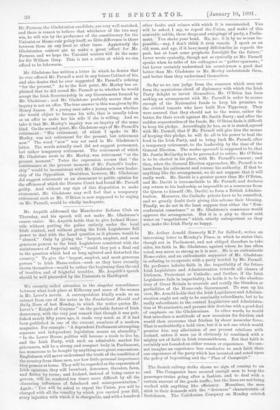We recently called attention to the singular resemblance between what
took place at Kilkenny and some of the scenes in Mr. Lever's novels. A correspondent kindly sends us an extract from one of the notes in the Sunderland Herald and Daily News of last Monday, in which the writer quotes Mr. Lever's " Knight of Gwynne " on the probable future of Irish democracy, with the very just remark that though it was pub- fished nearly fifty years ago, it reads very much as if it had been published in one of the current numbers of a modern magazine. For example : "A dependent Parliament attempting separate and independent legislation means an absurdity." " In the Lower House, polities will become a trade to live by, and the Irish Party, with such an admirable market for grievances, will be a strong and compact body in Parliament, too numerous to be bought by anything save great concessions. Englishmen will never understand the truth of the condition of the country from these men, nor how little personal importance they possess at home, They will be regarded as the exponents of Irish opinions, they will browbeat, denounce, threaten, fawn, and flatter by turns ; and Ireland, instead of being easier to govern, will be rendered ten times more difficult by all the obscuring influences of falsehood and misrepresentation." Again " You will be asked to repeal the Union, you will be charged with all the venality by which you carried your Bill, every injustice with which it is chargeable, and with a hundred other faults and crimes with which it is unconnected. You will be asked, I say, to repeal the Union, and make of this, miserable rabble, these dregs and sweepings of party, a Parlia- ment. You shake your head. No, no ; it is by no means im- possible,—nay, I don't think it even remote. I speak as an old man, and age, if it have many deficiencies as regards the- past, has at least some prophetic foresight for the future." Lever wrote cynically, though not so cynically as Mr. Parnell speaks when he talks of his colleagues as " gutter-sparrows ; but Lever certainly understood his countrymen a good deal better than Mr. Gladstone or Mr. Morley understands them, and better than they understand themselves.
































 Previous page
Previous page